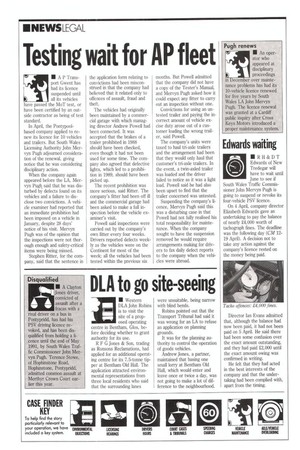Testing wait for AP fleet In April, the Pontypoolbased company
Page 18

If you've noticed an error in this article please click here to report it so we can fix it.
applied to renew its licence for 10 vehicles and trailers. But South Wales Licensing Authority John Mervyn Pugh adjourned consideration of the renewal, giving notice that he was considering disciplinary action.
When the company again appeared before the LA, Mervyn Pugh said that he was disturbed by defects found on its vehicles and a failure to disclose two convictions. A vehicle examiner had reported that an immediate prohibition had been imposed on a vehicle in January, despite 28 days' notice of his visit. Mervyn Pugh was of the opinion that the inspections were not thorough enough and safety-critical items were being missed.
Stephen Ritter, for the company, said that the sentence in the application form relating to convictions had been misconstrued in that the company had believed that it related only to offences of assault, fraud and theft.
The vehicles had originally been maintained by a commercial garage with which managing director Andrew Powell had been connected. It was accepted that the brakes of a trailer prohibited in 1988 should have been checked, even though it had not been used for some time. The company also agreed that defective lights, which led to a prohibition in 1989, should have been picked up.
The recent prohibition was more serious, said Ritter. The company's fitter had been off ill and the commercial garage had been asked to make a full inspection before the vehicle examiner's visit.
Powell said inspections were carried out by the company's own fitter every four weeks. Drivers reported defects weekly as the vehicles were on the Continent for most of the week; all the vehicles had been tested within the previous six months. But Powell admitted that the company did not have a copy of the Tester's Manual, and Mervyn Pugh asked how it could expect any fitter to carry out an inspection without one.
Convictions for using an untested trailer and paying the incorrect amount of vehicle excise duty arose out of a customer loading the wrong trailer, said Powell.
The company's units were taxed to haul tri-axle trailers and the arrangement had been that they would only haul that customer's tri-axle trailers. In the event, a twin-axled trailer was loaded and the driver failed to notice as it was a light load. Powell said he had also been upset to find that the trailer concerned was untested.
Suspending the company's licence, Mervyn Pugh said this was a disturbing case in that Powell had not fully realised his total responsibility for maintenance. When the company sought to have the suspension removed he would require arrangements making for drivers to fax daily defect reports to the company when the vehicles were abroad.




































































































